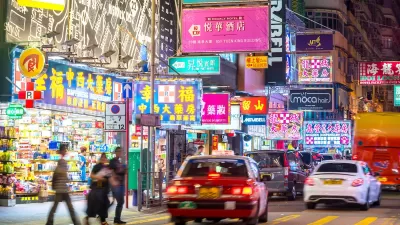The era of cheap, on-demand services is coming to a close as unprofitable startups face the realities of capitalism.

Writing in The Atlantic, Derek Thompson warns of the “end of the millennial lifestyle subsidy,” that blissful era when Uber rides across town cost a few dollars and you could have a meal delivered from any restaurant for a nominal extra fee. “Almost each time you or I ordered a pizza or hailed a taxi, the company behind that app lost money. In effect, these start-ups, backed by venture capital, were paying us, the consumers, to buy their products.”
Yet investors continued to support companies that grew their user bases while losing money. “As long as money was cheap and Silicon Valley told itself the next world-conquering consumer-tech firm was one funding round away, the best way for a start-up to make money from venture capitalists was to lose money acquiring a gazillion customers.”
Now, those companies are facing a reckoning. “These start-ups weren’t nonprofits, charities, or state-run socialist enterprises. Eventually, they had to do a capitalism and turn a profit.” By 2022, “Rising interest rates turned off the spigot for money-losing start-ups, which, combined with energy inflation and rising wages for low-income workers, has forced Uber, Lyft, and all the rest to make their services more expensive.”
Meanwhile, improved labor market conditions mean that workers have more leverage over employers. “Today, job openings are historically plentiful and nominal wages are rising fastest for low-income workers.”
It turns out, Thompson concludes, “The golden age of bougie on-demand urban-tech discounting has come to a close.” We may now have to go back to paying the real cost of products and services.
FULL STORY: Why Urban Life Suddenly Got Way More Expensive

Planetizen Federal Action Tracker
A weekly monitor of how Trump’s orders and actions are impacting planners and planning in America.

Congressman Proposes Bill to Rename DC Metro “Trump Train”
The Make Autorail Great Again Act would withhold federal funding to the system until the Washington Metropolitan Area Transit Authority (WMATA), rebrands as the Washington Metropolitan Authority for Greater Access (WMAGA).

The Simple Legislative Tool Transforming Vacant Downtowns
In California, Michigan and Georgia, an easy win is bringing dollars — and delight — back to city centers.

The States Losing Rural Delivery Rooms at an Alarming Pace
In some states, as few as 9% of rural hospitals still deliver babies. As a result, rising pre-term births, no adequate pre-term care and "harrowing" close calls are a growing reality.

The Small South Asian Republic Going all in on EVs
Thanks to one simple policy change less than five years ago, 65% of new cars in this Himalayan country are now electric.

DC Backpedals on Bike Lane Protection, Swaps Barriers for Paint
Citing aesthetic concerns, the city is removing the concrete barriers and flexposts that once separated Arizona Avenue cyclists from motor vehicles.
Urban Design for Planners 1: Software Tools
This six-course series explores essential urban design concepts using open source software and equips planners with the tools they need to participate fully in the urban design process.
Planning for Universal Design
Learn the tools for implementing Universal Design in planning regulations.
Smith Gee Studio
City of Charlotte
City of Camden Redevelopment Agency
City of Astoria
Transportation Research & Education Center (TREC) at Portland State University
US High Speed Rail Association
City of Camden Redevelopment Agency
Municipality of Princeton (NJ)





























